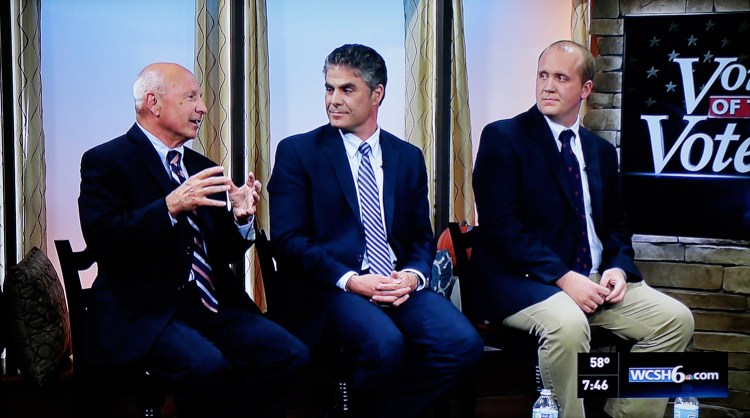Portland Mayor Michael Brennan went on the offensive early against challenger and fellow Democrat Ethan Strimling in a debate Tuesday night, prompting Strimling to counter and take positions on controversial issues he had been undecided on previously.
Strimling, a former state senator, said he is now opposed to referendum questions on the November ballot seeking to raise the city’s minimum wage to $15 per hour and to protect scenic views.
Their frank exchanges – and Strimling’s declaration of positions on key issues – were the biggest developments in the debate, which was broadcast live on WCSH-TV, Channel 6.
The half-hour debate was the fifth in a series of mayoral debates and forums leading up to the Nov. 3 election. It featured all three candidates seated side by side, fielding questions from moderators Pat Callaghan of WCSH and Randy Billings of the Portland Press Herald.
Brennan, who is seeking a second term, is trying to fend off challenges from Strimling, who has garnered many political endorsements recently, and Portland Green Party leader Tom MacMillan, who has never held elected office.
Callaghan asked the first question of the evening following a remark by MacMillan in his opening statement that he supports the citizens referendum to raise the city’s minimum wage to $15.
Callaghan asked the candidates whether the number of referendum campaigns in the city – such as a successful citizens movement to stop development at Congress Square plaza and the scenic views question – represents a failure of leadership.
Brennan quickly answered no, then criticized Strimling for flip-flopping on his vision of the mayor’s job since 2011, when Brennan defeated Strimling in the first popular election of a mayor in Portland since 1923.
“Four years ago, Ethan was going to be the CEO of the city of Portland and run the city as a CEO and he was going to develop every square inch of the city. Now four years later, we have someone who is going to be on the board of directors and bring everyone together and try to articulate the vision for Portland,” Brennan said.
Strimling, in response, agreed that his position has evolved and cited endorsements he has received this election cycle from four of the eight sitting City Council members and seven of the nine sitting school board members.
“Look, I do think I need to now be the chair. When I ran four years ago and thought about this job as a CEO and said this person needs to come in and dictate a vision, I don’t think that that was correct. What we need is someone who is going to bring folks together,” Strimling said. “There is no question that these referendums are a reflection of a vacuum in leadership. Look, I plan to vote against both of these referendums, but I hear from people over and over again how frustrated they are that they are even asking the question in the first place.”
MacMillan took the opportunity to point out how alike Brennan and Strimling are on many issues, both opposing ballot Question 1 to raise the minimum wage and Question 2 to provide protections for scenic views. MacMillan favors both referendum questions.
“I’m disappointed that both candidates here stand against living wages. We need to raise the minimum wage for all workers to get by. The average person is struggling. We see taxes go up. We see rent go up. Wages are stagnant. These candidates are opposed to helping working-class people and I’m very disappointed,” MacMillan said.
The candidates also differentiated themselves in answering a question posed by Billings about whether Portland, a heavily Democratic city, could benefit by resetting its relationship Gov. Paul LePage, the state’s Republican chief executive.
Strimling answered that at as a political commentator, he has often been critical of the governor. But he highlighted his work over the last 15 years as executive director of the Portland nonprofit Learning Works, collaborating with many different governors.
“We don’t agree on a whole lot,” Strimling said of LePage, “but if there is a way, I will certainly use it to the city’s benefit.”
Brennan answered the question another way, by highlighting his record standing up to LePage. He said he has been effective working instead with the Legislature and in coalitions with other cities to maintain funding for Portland even as LePage seeks cuts, particularly to welfare.
“The fact of the matter is that the governor goes out of his way to make disparaging remarks about the city of Portland and he opposes us at every turn, on economic development projects and to move the city forward,” Brennan said.
MacMillan said that as a member of the Portland Green Party, he could avoid the partisan divide between Democrats and Republicans in the state.
“As neither a Democrat nor a Republican, I am going to be able to break the logjam in a way that the partisan nature of Democrats and Republicans just can’t do,” MacMillan said. But he quickly added that no matter who is elected mayor, it will be a tough relationship with the governor, “just because he doesn’t like Portland.”
Send questions/comments to the editors.


